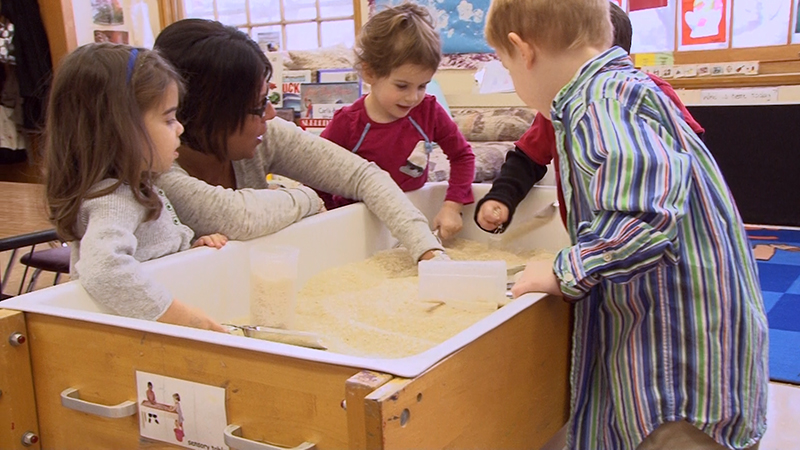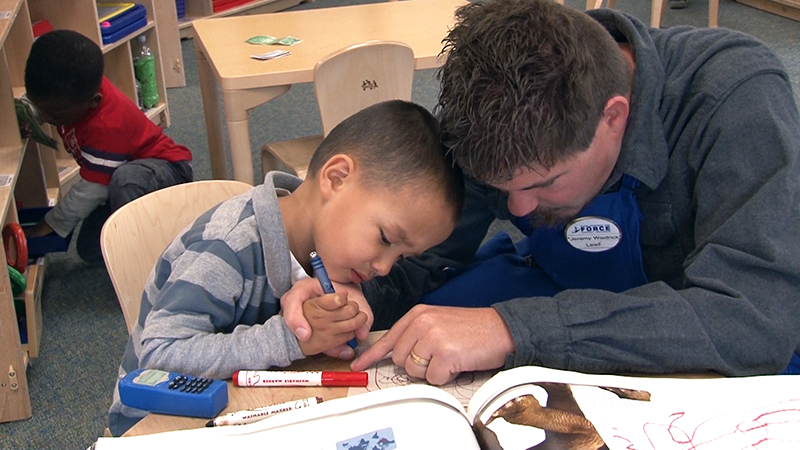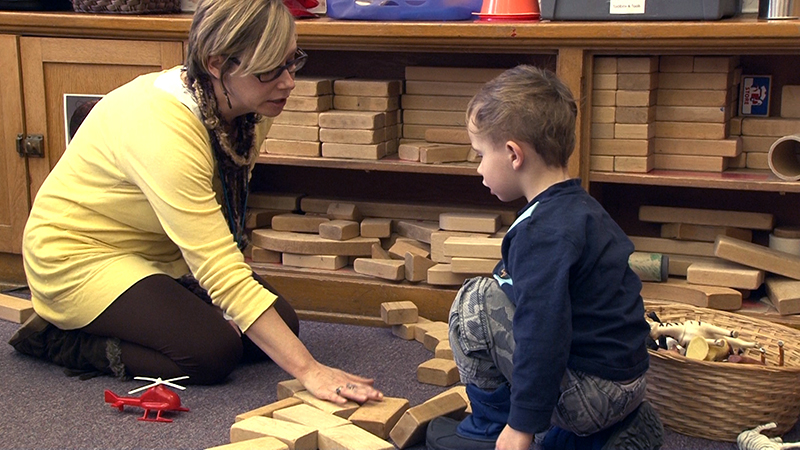本课程突出了作为响应性学前班教师的意义,并在与儿童,家庭和同事们互动时,为如何促进工作场所的社会情感能力提供见解。万博体育全站app一个关键学习狗万app怎么下载点是自我反思和协作,支持关系的重要性。
辅助标签
- Reflect on what it means to be a responsive preschool teacher.
- 反思是成为一个社会情感主管的学龄前老师意味着什么。万博体育全站app
- 头脑风暴如何在学龄前教室和计划中培养和培养社会情感能力。万博体育全站app
学习
知道
How do you nurture and sustain your social-emotional health in your personal life? Are there rituals or activities you engage in that make you feel more connected to yourself or to others? Are there individuals who nurture and inspire you to be and feel your best?
你的职业生活怎么样?你如何在工作中培养你的社交情绪健康?您的工作环境有哪些元素维持您的社交情绪健康?是与同事或主管的关系吗?是否自由独立工作以计划经验和使用材料?是否有关同事的指导和建设性的反馈?当出现情况时是否共享顾虑,想法和头脑风暴解决方案?与儿童和家庭有关系吗?
Throughout this course, you have been learning about the importance of being a responsive caregiver for children’s social-emotional development and that caring, responsive, and attentive adults can foster children’s social-emotional competence and growth. So what does it mean to be a responsive adult?Responsivenessis seen when an adult changes how he or she interacts with a child to match the child’s needs. The adult supports the child, responds immediately, and reacts with positive affect that matches the child’s needs and development.
What Does It Mean To Be A Responsive Preschool Teacher?
研究人员Carl Dunst和Danielle Kassow(2008)已经确定了照顾者 - 儿童关系中敏感性和响应性的关键特征。虽然Dunst和Kassow的(2008)的研究侧重于为婴儿或幼儿定义敏感的护理,但下面我们概述了学龄前儿童教师最重要的响应特征。万博体育全站app在本课程的探索部分中,您将有机会反思这些元素,因为他们与您在学前班的经验相关。万博体育全站app
邓斯特和卡西沃的6个响应特征

-
积极的态度:
老师经常微笑,嘲笑并为孩子提供积极的陈述。例如,当早上到来时,一位老师可能会对孩子微笑并说:“今天早上很高兴见到你!”或者老师可能会对孩子们讲笑话的回应来微笑和笑。研究表明,教师应为每个指令或负面陈述提供五个肯定陈述。Negative or directive statements include demands (e.g., “Stop running on the playground”), nags (e.g., “I keep telling you to stop dripping water on the floor”), criticism (“Julian, you are not listening or doing what you are supposed to do”), or avoidance of a particular child (e.g., the teacher may see a child struggling with an activity and avoid the opportunity to help). Teachers should avoid and limit negative and directive statements. Positive statements can be verbal or nonverbal. Nonverbal positive statements can include following the child’s lead in play, hugs, smiles, specific praise and encouragement, listening to a child tell a story or talk about an experience, or giving positive comments to a child’s mom and dad upon arrival or departure.
-
Support:
老师可用,并帮助每个孩子发展。例如,许多学龄前儿童正在学习分享玩具万博体育全站app,并与同行轮流。狗万app怎么下载老师每天为儿童安排多个机会,以便在不同的课堂活动中练习轮流,例如圈子,中心和零食或室外游戏。老师支持儿童通过建模,身体支持儿童,并提供鼓励和分享和轮流的鼓励和特定的赞誉来轮流和分享。
-
响应质量:
老师立即回应并适当地匹配孩子的需求。例如,如果教室里的孩子因为划痕而哭泣,老师在他或她平静下来并帮助孩子绷带受影响的地区,老师平静地与孩子谈话。如果孩子兴奋,因为他或她刚刚掌握了一项新技能(如骑三轮车),老师也会兴奋地回应。

-
同步:
教师和孩子之间的关系是双方的互惠和奖励。例如,当他们读一个最喜欢的傻书时,老师和孩子一起笑了,或者他们喜欢在零食前洗手时唱歌愚蠢的歌曲。
-
Stimulation:
老师安排环境,为游戏和学习提供多种机会,以及儿童的参与和鼓励。狗万app怎么下载老师包括课堂上的一系列发育合适的材料,故意使用机会教导孩子们轮流与材料一起使用,并监控儿童,以确保他们参与和学习形成他们的环境。狗万app怎么下载此外,教师承认儿童的个人差异,偏好和学习风格,并响应他们的需求。狗万app怎么下载
-
相互性:
成年人和孩子经常在环境中关注对象,活动和人物,并讨论它们。例如,在游乐场玩耍时,老师和孩子都观察一只鸟飞的鸟,或在零食期间,老师和孩子们可能会看着墙上的新海报。

成为一个社会和情感主管的学龄前老师意味着什么?万博体育全站app
社会情感增长和发展是人类经验的关键部分;它帮助我们学习自己,建立和维护与他人的关系,并允许有意义的学习体验。狗万app怎么下载在您与学龄前儿童的日常互动中,您有责任通过设计支持环境和响应性来万博体育全站app构建与他们的关系并促进儿童的关系。建立关系是一个必不可少的,主要的教学成分。
在课程中,您有机会探索您对社交情绪发展的看法。本课程通过鼓励您在工作场所考虑社交情感发展并问自己成为社会和情感主管的学龄前老师意味着什么来延长这一探索。万博体育全站app
In your work, you are responsible for creating meaningful experiences that incorporate opportunities for the practice of social-emotional skills throughout the day. Being a socially and emotionally competent teacher can be expressed in a number of different ways:
- 花时间努力建立和维护与儿童和同事的关系,在您的课堂和计划中
- 试图解决挑战的解决方案
- Demonstrating flexibility
- Allowing yourself to make mistakes
- 培养和响应
- 尝试新事物
- Asking for help or support when facing difficulties
- Helping others in need
- 愿意接受新的或不同的观点
- 拥抱多样性
- open
- Sharing your own emotions and thoughts
What are some of your own views about being a socially-emotionally competent preschool teacher? Pause for a few moments and think about this. .
看到
视频|点击此处观看TED会谈“从鼓舞人心的教师谈话”(http://www.ted.com/playlists/182/talks_from_inspiring_teachers)
Do
在学龄前教室和计划中培养和培育社会情感能力万博体育全站app
社交能力有助于您成为工作场所社区的一部分,感觉热情,支持,友好,精力充沛和培育。它有助于您在一系列有意义的方式中吸引儿童,家庭和同事。在与您的计划中与儿童,家庭和同事们一起考虑以下内容。
与孩子们一起参与
- 在与孩子合作时展示同理心和同情心。通过自己展示这些属性,激励孩子们才能善于同情。
- 演示positive social skills with children throughout the day, encourage children to do the same, and positively reinforce them when doing so.
- 使用儿童的背景,经验和兴趣作为关于您教室中经验和活动的想法的灵感。
- Cultivate a climate of respect and appreciation of individual differences in your classroom. Invite children to share their views and experiences with you.
- 演示respect for children’s values and opinions. Your example will be setting the tone for how children view themselves and for how they treat others.
Engaging with families
- Families can be your program’s window into culturally responsive experiences. Invite families to share meaningful experiences.
- 为您的课堂和计划中儿童的家庭提供机会,以满足并相互了解。
- 邀请家庭观察和参加您的一些课堂活动。
- 向孩子们送家庭书籍有关情感和社交情感技能。
- Encourage families to nurture social-emotional skills at home by extending some of your classroom and school experiences in the home environment.
Engaging with colleagues
- Connect with your colleagues. Share your interests and experiences with colleagues during staff meetings, lunch breaks, or in-service days. Explain how these interests drive some of the experiences you create for children in your classroom. Get to know the people you work with on a personal level.
- 与同事交流思想,了解促进社会情绪增长的经验。邀请一位同事来到你的房间,观察你的活动,并给你反馈。为您的同事做同样的要求。
- Ask a trainer, coach, or supervisor to observe your classroom so they can offer feedback about your use of materials and experiences to promote children’s social-emotional growth.
- 承认正在做出伟大事物的同事,为您提供指导和建设性的反馈,并激励您争取卓越,并成为团队参与者。
在本课程的学习部分中,您将找到有关前十大实践的信息,以促进学龄前教室的社会情感素养。万博体育全站app
Explore
您如何定义弹性和社交情感发展?响应主义教师特征如何与孩子们涉及您的练习?这些是要思考的重要问题。
下载并打印思考自己的恢复力那响应主义老师清单,和响应主义老师清单Self-Reflection handouts。需要几分钟才能阅读并回复每个讲义中的问题。然后,与培训师,教练或主管分享并讨论您的回复。
应用
下载并打印handout,狗万app怎么下载了解更多关于弹性的信息那which contains links to additional resources you can use to better understand and explore adult resilience and social-emotional well-being. After accessing and reviewing the video clips and information, share and discuss your experiences with a trainer, coach, or supervisor.
演示
Berk, L. E. (2013).儿童发展(9th ed.). Upper Saddle River, NJ: Pearson Education Inc.
Carter, M., Cividances, W., Curtis, D., & Lebo, D. (2010). Becoming a Reflective Teacher.教育幼儿那3.(4), 18-20.
Colker, L. J. (2010). Teaching Preschoolers to Think Optimistically.教育幼儿,4(1),20-23。
Dunst,C.,&Kassow,D。(2008)。照顾者敏感,或有社会响应能力和安全的婴儿依恋。早期和密集的行为干预杂志5,40-56。
Joseph,G. E.,&Strut,P. S.(2004)。与幼儿建立正面关系。年轻的特殊孩子7,21-29。
Joseph, G. E. & Strain, P. S. (2003).You’ve Got to Have Friends。Center on the Social and Emotional Foundations for Early Learning: Training Materials.
国家幼儿教育协会。(2010)。成为一名反思教师(培训补充剂)。
Reivich,K.&Shatté,A.(2002)。The Resilience Factor。New York, NY: Broadway Books.
Schickeadanz, J. A., Hansen, K., & Forsyth, P. D. (2000).Understanding Children。山景,加利福尼亚州:梅菲尔德出版公司。
Schneider,S.(2001)。寻找现实的乐观主义。美国心理学家56(3),250-261。
Seligman, M. E. P., Reivich, K., Jaycox, L., & Gillham, J. (1995).The Optimistic Child。纽约,纽约:哈珀多年生。
Trawick-Smith, J. W. (2014).幼儿发展:多元文化视角,(第6届)。上鞍河,新泽西:皮尔逊教育公司







